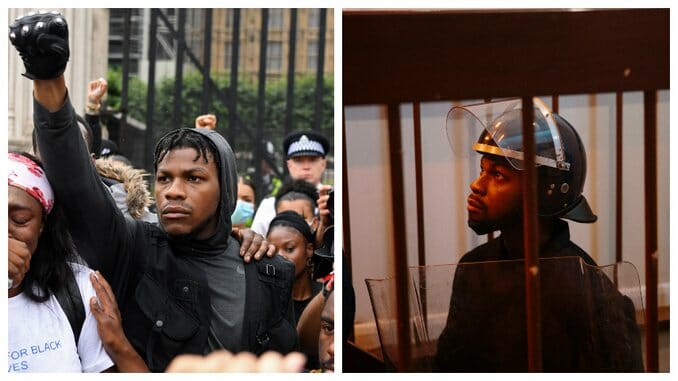John Boyega’s Year Culminates In Every Way With Small Axe: Red, White and Blue
Photos Courtesy of Daniel Leal-Olivasafp via Getty Images/Amazon
“Look, I don’t know if I’m going to have a career after this, but fuck that.”
John Boyega shouted these heartfelt words into a megaphone six months ago during an emotional speech at a London Black Lives Matter rally. The actor, who’d seen the new Star Wars trilogy he helped lead come to an end last year, put his heart on his sleeve in a visible act of defiant, “vital” activism. It’s been a courageous year for Boyega and—with his entry of director Steve McQueen’s Small Axe collection, Red, White and Blue, hitting Amazon this weekend—he’s looking to finish with a role that both connects to his real life and proves that he’ll have a film career for as long as he wants one.
Boyega plays Leroy Logan in Red, White and Blue, a real-life scientist who became a cop after his father was assaulted by London police. Logan, rather than simply hate the police after their racist attack, becomes dead-set on fixing them from the inside. An expectant father himself, he’s looking to the future. He speaks up, early and often, about the police’s white isolation from the city’s diverse community. He’s called a traitor by his neighbors and racial slurs by his co-workers. But he perseveres against the machine, unsure if his work even matters.
While Boyega’s Hyde Park speech, specifically its protest setting and megaphoned eloquence, draws close parallels with Small Axe’s earlier entry, Mangrove, its central desire for reform is a throughline that helps sustain and link the films. The films are obviously tied to real life—Logan and the Mangrove Nine are real people, after all, not even considering 2020’s prominent months of protests against racial injustice—and the fact that Disney blockbuster peers (and longtime friends) Boyega and Letitia Wright lead the charge makes the films all the more layered.
Boyega’s been using his AAA platform to affect change at a time when others, newly freed from a franchise, might stay quiet and collect their checks. He hasn’t minced words. “Black lives have always mattered,” Boyega said in June. “We have always been important. We have always meant something. We have always succeeded regardless. And now is the time. I ain’t waiting. I ain’t waiting.”
That action isn’t limited to broader statements against systemic racism. John Boyega drilled down into industry specifics, fighting back against a Disney machine that incentivizes the smiling, PR-prepped, blink-twice-if-you-need-help aura emanating from actors associated with AAA properties. His critique of how the Star Wars studio handled non-white characters—still incredibly tactful—came a few months after his protest speech.
Boyega explained that he would tell Disney “do not bring out a Black character, market them to be much more important in the franchise than they are and then have them pushed to the side. It’s not good. I’ll say it straight up.”
-

-

-

-

-

-

-

-

-

-

-

-

-

-

-

-

-

-

-

-

-

-

-

-

-

-

-

-

-

-

-

-

-

-

-

-

-

-

-

-








































